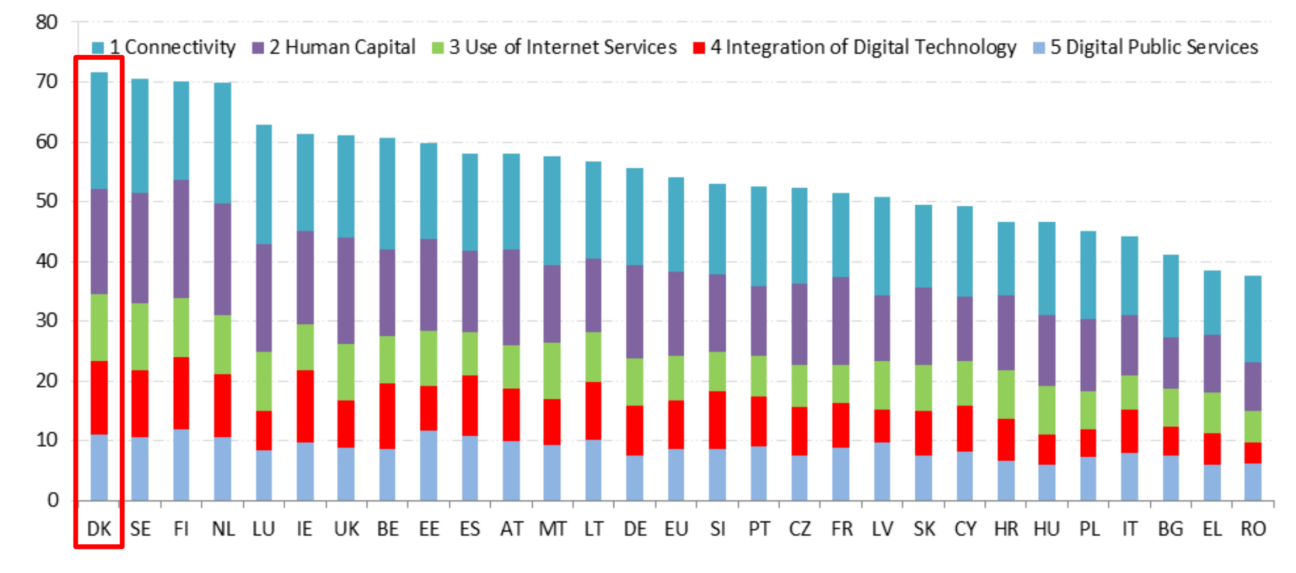Publication 1 October 2019
Denmark: A digital will

A “digital-by-default” policy and a fast-paced digitisation of public services
Since the 2000s, digital transformation has been at the top of the Danish political agenda. In order to anchor the use of digital services as part of citizens’ habits, the government has systematically incorporated their use into the laws under discussion.
For example, in 2015 the State made the use of digital technology mandatory for communications with the administration and for access to administrative services. This “digital-by-default policy” shows a strong will to adapt to technological developments and to introduce their use widely.
In addition, the digital transformation of the Danish public administration consists not only of the evolution of interface, but it also concerns the back office used by public officials. The country has thus transformed the totality of its administrative process: from user-administration relations to internal administrative processes and inter-administration interactions.
Among the factors contributing to this “co-transformation”, two notable examples include the systematic association of public officials to the development of digital tools, and the integration of user experience feedback.

2018 ranking of European countries according to the Digital Economy and Society Index (DESI)¹
A relationship of trust established and maintained with citizens
Citizens’ trust in their administration has been a crucial element in the process of the digital transformation of the Danish State. Public authorities pay special attention to it.
The management of this process through a single dedicated public agency, the Danish Agency for Digitisation, is held as a measure of trust for Danish citizens. This attention then feeds the effort to accompany and educate citizens and greatly contributes to the deployment of the digital transformation. In addition, the quality of services and the importance given to citizens’ data protection are essential.
Adam Lebech
Deputy Director General of the Danish Agency for Digitisation
A multi-stakeholder governance
The “cross-governmental partnership”, is a key element of Denmark’s digital transformation. Municipalities, regions and ministries are included as stakeholders in the Steering Committee for the Digital Transformation of the State. They all cooperate and are responsible for the successful development of the digitisation of administrative processes.
Moreover, public authorities rely on private sector expertise – notably the Danish digital innovation sector – in order to transform the State. These companies accompany the transformation process and participate in the adaptability of public services.
A new function for digital diplomacy advice on national policy
In 2017, Denmark was the first country to raise digital issues to the rank of diplomatic affairs with the creation of the position of “Tech Ambassador”. However, the Danish Tech Ambassador still enjoys a “one-of-a-kind” field of action: on the one hand, he represents the government in its relations with digital companies, on the other hand, he advises the different ministries and national policy makers.
¹ “Digital Economy and Society Index 2018, Country Report Denmark”, European Commission, 2018.
Digital Denmark in 5 key figures
1st
92.7%
90%
1/3
1
WORKING GROUP
Working group
-

Julien Nocetti
French Institute of International Relations (Ifri)
-

Philippe Régnard
La Poste
-

Amal Taleb
SAP France
-

Philippe Walter
Microsoft France
-

Publication 24 June 2021
Health data: Getting citizens onboard
